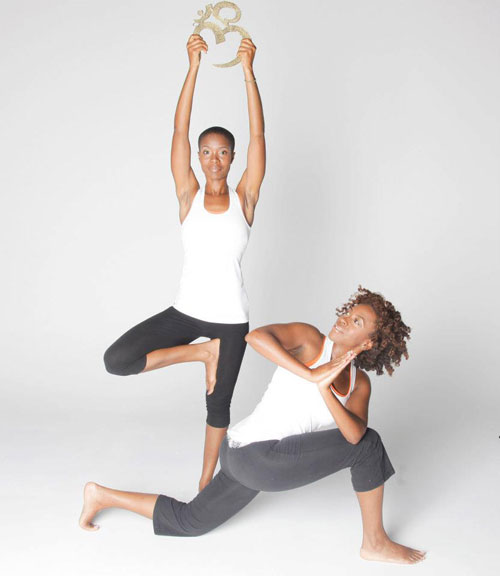This month my favorite yoga studio Om Point Yoga re-opened after a prolonged search for a new location. It feels sooooo good to get back to doing a regular yoga practice. (That is Vanya and Shavonna from Om Point in this photo.) To celebrate I am updating and re-posting an article I originally posted a few years ago over at www.opare.net our medical practice site.
What kind of person comes to your mind when you think about a yoga class student? If it is some young, skinny, white girl who can put her leg behind her head or some sort of religion or cult you probably aren’t alone. The image of yoga here in the US is full of new age hippy-like white folks twisting themselves into pretzels in some variant of a yoga method created by a turban wearing Indian Yogi Master. That is certainly the image I get reading Yoga magazines like Yoga Journal. But what is the reality? Like so much of the popularized view we get of the world, the view of yoga is seen through the filter of the white dominated media. Fortunately there is much more to yoga. There is a place for Blacks on the yoga mat and in a yoga class.
 Did you know that yoga was practiced long before it was practiced in India? According to the Kemetic Yoga Association “Yoga was practiced in Ancient Egypt, North East Afrika, for a very long time. Research has indicated that the philosophy of personality integration, or yoga, was practiced in Egypt for about 10,000 years which is a great expanse of time.” Kemet is the original name for the land now called Egypt. There are hyro-glyphs and other depictions from Kemet showing yoga poses and explaining their significance. Kemetic Yoga as a style of yoga is growing as more people become aware of it. Here is me and Nana Kwaku taking a kemetic yoga class.
Did you know that yoga was practiced long before it was practiced in India? According to the Kemetic Yoga Association “Yoga was practiced in Ancient Egypt, North East Afrika, for a very long time. Research has indicated that the philosophy of personality integration, or yoga, was practiced in Egypt for about 10,000 years which is a great expanse of time.” Kemet is the original name for the land now called Egypt. There are hyro-glyphs and other depictions from Kemet showing yoga poses and explaining their significance. Kemetic Yoga as a style of yoga is growing as more people become aware of it. Here is me and Nana Kwaku taking a kemetic yoga class.
There are many Black yoga teachers here in Atlanta and all around the country teaching a wide variety of yoga styles. Chelsea Jackson, yoga teacher, regularly posts a “Yogi in the Community” segment on her Chelsea Loves Yoga blog. Each features a profile about a Black yoga teacher and their story. These sisters and brothers come from our communities, understand our communities and embody the Afrikan roots of this ancient tradition. Many of the sisters have bodies with hips and curves that we may be better able to relate to. They may be older, having begun teaching yoga as a second career. They may use music in their classes that reflects our culture, and bring a greater sense of belonging and of coming home for Black yoga students.
No matter your age or your fitness level yoga can be an important part of a healthy lifestyle. Yoga is not a religion. It is a health exercise or internal exercise. It is very adaptable and can meet you where you are. Poses can be modified and/or done in a chair. The Asanas or poses help to strengthen, open, and cleanse the body, make the spine supple and promote circulation in all the organs, glands, and tissues. Yoga postures also stretch and align the body, promoting balance and flexibility. I find that the more I practice the stronger I get. Gradually I am able to do more and more. I find I understand my body better, recognize when I am not standing or sitting correctly, and have tools to ease the tension daily life can cause.
So the next time you think YOGA, no matter if you are 18, 28, 58, or 78, no matter your weight, think Afrika. Think Black. Think about belonging and learning, improving flexibility, strengthening muscles, tuning in to our body, practicing deep breathing, and improving your overall well-being. Think, “This is for me too!”
And if you are in the Atlanta area come join me at Om Point Yoga with Vanya Francis!
Do you do yoga? How has it impacted your life? Do you know about other Afrikan/Black yoga studios or teachers? Leave us a comment and share your thoughts.

A library of courses to show you how to make delicious healthy meals, deal with your cravings, feel confident about what you are eating, and navigate the non-vegan world you live in.

